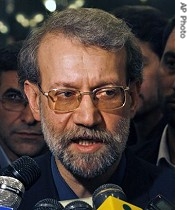-
(单词翻译:双击或拖选)
By Challiss McDonough
Cairo
01 June 2008
Iranian lawmakers have picked former nuclear negotiator Ali Larijani as the new speaker of parliament. He is seen as a key conservative rival to President Mahmoud Ahmadinejad, and may use his post to launch a presidential campaign for next year. VOA Correspondent Challiss McDonough has more from our Middle East bureau in Cairo.
 |
| Ali Larijani, 01 Jun 2008 |
Iran's new parliament elected Ali Larijani as temporary speaker last week, but has now voted to give him the job for a full year.
Larijani is seen as a key rival to President Mahmoud Ahmadinejad from within the president's conservative movement. He resigned from his position as Iran's top nuclear negotiator last year and was elected to parliament in March. Some believe he could use his new post to challenge Mr. Ahmadinejad in next year's presidential election.
Analysts1 say the conservative camp has become divided into competing factions2 over two main issues - Mr. Ahmadinejad's economic policies and his aggressively anti-Western approach to the nuclear dispute, which his critics say has further isolated3 Iran.
Larijani and other so-called "moderate conservatives" agree with the president about Iran's right to pursue nuclear technology, but they have advocated more dialogue with the West.
But Mr. Ahmadinejad's economic policies - and the skyrocketing inflation they are blamed for - are believed to have fueled much of the discontent within the conservative movement.
Kuwait-based political scientist and regional affairs expert Mohammad El-Sayed Selim said Larijani's new position is one with significant influence.
"I think the election Ali Larijani to some extent weakens the grip of Mahmoud Ahmadinejad on power," said Mohammad El-Sayed Selim. "Now Ali Larijani is in a very good position to question [Mr.] Ahmadinejad's economic policies, and he is quite critical of his economic policies."
Selim adds that the new parliamentary speaker will also be in a position to voice his opinions on Iran's nuclear program. Larijani has already taken advantage of that, saying in his first speech to lawmakers on Wednesday that parliament may use its authority to revise Iran's cooperation with the U.N. nuclear watchdog.
An Iranian foreign ministry4 spokesman echoed that warning. Spokesman Mohammad Ali Hosseini said Iran could set "new limits" on its cooperation with the International Atomic Energy Agency.
The comments follow last week's IAEA report to the board of governors, which said Iran could be withholding5 key information about high-explosives tests and its missile program.
The agency says it has not received sufficient explanations from Iran about intelligence reports indicating that Iran was working on a covert6 nuclear weapons program before 2003.
In the past week, several Iranian officials have denounced the IAEA report, and have called the intelligence documents forgeries7.
 收听单词发音
收听单词发音
1
analysts

|
|
| 分析家,化验员( analyst的名词复数 ) | |
参考例句: |
|
|
|
2
factions

|
|
| 组织中的小派别,派系( faction的名词复数 ) | |
参考例句: |
|
|
|
3
isolated

|
|
| adj.与世隔绝的 | |
参考例句: |
|
|
|
4
ministry

|
|
| n.(政府的)部;牧师 | |
参考例句: |
|
|
|
5
withholding

|
|
| 扣缴税款 | |
参考例句: |
|
|
|
6
covert

|
|
| adj.隐藏的;暗地里的 | |
参考例句: |
|
|
|
7
forgeries

|
|
| 伪造( forgery的名词复数 ); 伪造的文件、签名等 | |
参考例句: |
|
|
|















